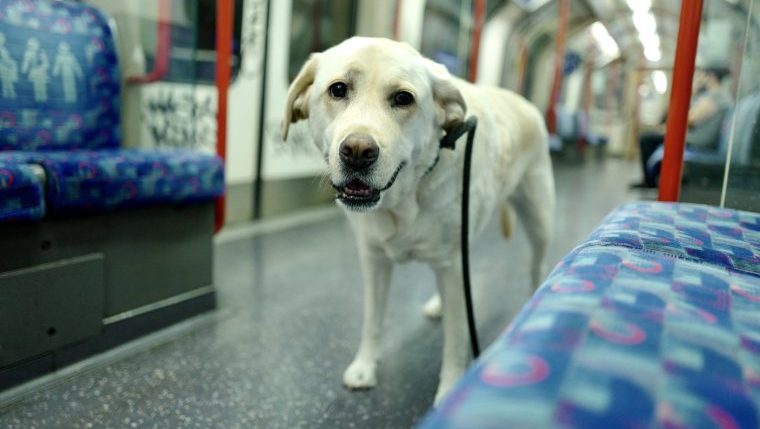
As of October 15, and for the next nine months, dogs can ride Montreal’s metro for free, albeit with strict rules. On the heels of an SPCA and public petition, the Société de transport de Montréal (STM) launched the pilot project in hopes of making transit more accessible, reports Montreal’s CTV News.
Rules for Dogs Riding the Metro
There are some stipulations for dogs to be able to ride the metro. They are:
- Dogs will only be allowed on the Metro between 10 a.m. and 3 p.m. and after 7 p.m. on weekdays (to avoid rush hour), with no limits on weekends and holidays.
- A pet parent can only have one dog with them at a time, and must keep them leashed and muzzled.
- Dogs aren’t allowed on seats or in the front car, where there’s reserved space for bicycles.
- Pet parents will be responsible for any messes from the pups.
If the rules aren’t followed, you could lose the privilege of riding with your furry best friend.
For the time being, dogs won’t be allowed on buses or paratransit vehicles, but the STM already allows caged pets and service animals on all public transit.
Commuter Commentary
“I’m happy to see dogs anywhere. I just love animals,” commuter Don MacFarlane told CBC News. “If dogs are under control…I’m happy to be with them.”
Commuter Jay Ritchie boarded the Metro with Zora, an Australian Shepherd puppy. “She was very comfortable, very relaxed; she took it all in,” said Ritchie. “Now she can go visit other dog parks and go for walks in other neighborhoods.”
A Learning Curve for Dogs
Martin Levac, who runs the dog training operation AAA Canine Interventions, told CBC News says the STM’s initiative is great because dogs will now be able to expand their horizons — though they may need training to adjust to a new environment like the Metro.
“For pups who have never taken public transportation, it’s best to take them on test trips before trying to go anywhere with a purpose, and to make sure the dog can leave if it gets agitated,” he advises.”It can be stressful if your dog isn’t used to crowded environments, the noises. It can be as simple as metal stairs if a dog has never been exposed to that.”
Not everyone is excited about sharing space with canines while commuting.
“I am afraid of dogs and don’t like the smell,” said commuter Nicole Frégeau. “I’d prefer if they had specific cars for the dogs so I could avoid them, but I understand it might be more practical for dog [parents]. I think with the leash and muzzle it’s safe, but it’s a pilot project so we’ll see in nine months when the results come out.”
The Muzzle Rule
Pet parents are looking forward to taking their pets on public transit, but some people aren’t keen on the muzzle rule. Ritchie told CBC News that she and Zora rode the Toronto subway where muzzles weren’t required. “I think she’d be more comfortable without it…I’d rather it wasn’t a rule,” said Ritchie. “Dogs sometimes act worse with it on if they aren’t used to it.”
Levac says muzzles are also something to add into a dog’s routine gradually, especially for those who have never worn one before. “Dogs rarely take to them right away, and it’s important not to push them too much since it can make it harder when trying again next time,” he said.
The Montreal SPCA was consulted for the pilot project, and it was also against muzzling. “Many cities around the world allow dogs in public transit without imposing mandatory muzzling,” said Sophie Gaillard, director of animal advocacy and legal affairs. “That’s the case notably in Toronto, and there haven’t been any public safety incidents since that was put in place. So we don’t really see why it’s necessary to muzzle dogs in Montreal.”
The SPCA has published an FAQ that details STM’s rules and provides a guide on how to best muzzle your dog.









